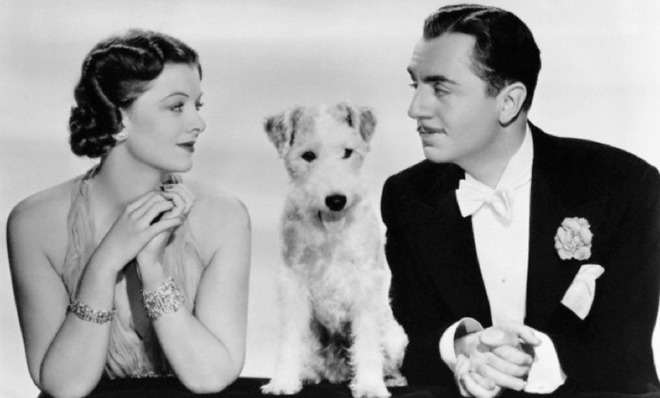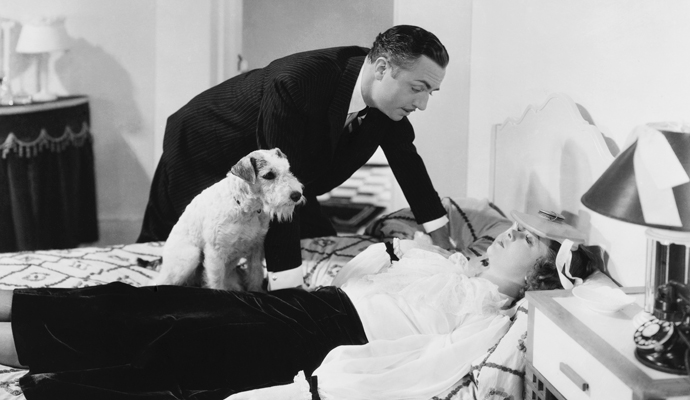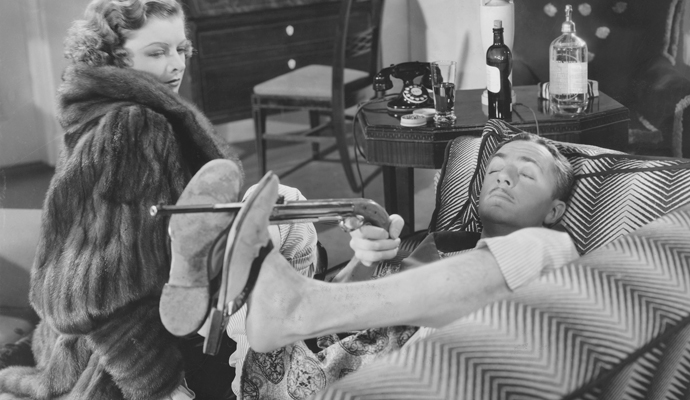Girls on Film: How The Thin Man's Nora Charles became Hollywood's 'perfect wife'
By diverging from the norms of the 1930s, The Thin Man introduced a female icon that has lost none of her power


A free daily email with the biggest news stories of the day – and the best features from TheWeek.com
You are now subscribed
Your newsletter sign-up was successful
The Thin Man's Nora Charles turns 80 this month. At first glance, it seems strange that Myrna Loy's fur-clad, drink-guzzling, and less-than-maternal Nora would have been toasted as the "perfect wife" by Tinseltown. As the actress is often quoted: "Some perfect wife I am... I've been married four times, divorced four times...have no children and can't boil an egg."
Nevertheless, the heroine of the 1934 classic was framed as the ideal — and it was a beautiful contradiction that changed how we think about women in cinema.
Nora Charles first appears in The Thin Man in a whirlwind of fur, jewelry, and gift boxes, while her dog Asta drags her through masses of people to get to the bar, where her husband Nick is (as always) drinking. The dog sends Nora flying to the floor, offering a perfect example of charming screwball klutziness. She's a beautiful, lanky brunette with a wicked jaw — and for some, that might have been enough.
The Week
Escape your echo chamber. Get the facts behind the news, plus analysis from multiple perspectives.

Sign up for The Week's Free Newsletters
From our morning news briefing to a weekly Good News Newsletter, get the best of The Week delivered directly to your inbox.
From our morning news briefing to a weekly Good News Newsletter, get the best of The Week delivered directly to your inbox.
But that's only the start of her characterization. Nora lines up six martinis in order to catch up to her husband. Drinking, danger, ne'er-do-wells — none of the unseemly aspects of Nick's life as a crime-solver faze Nora. Over the course of The Thin Man, Nora is intrigued by it all; she relishes her husband's talents, and embraces his idiosyncratic life. "Oh, Nicky. I love you because you know such lovely people," she says wryly.
Nora also doesn't create drama out of assumptions. When Nora walks in on Nick hugging distraught client Dorothy Wynant, it is not the basis for an argument about boundaries; instead, they make faces at each other. "Don't be silly," says Nora when Dorothy starts to apologize for needing a moment of comfort.
The lack of melodrama in Nick and Nora's life is why she was known as the "perfect wife." But it's not her acquiescence that makes her special; it's that their partnership falls outside the cultural norm. They aren't completely equal — Nick has a tendency to trick Nora away from danger and sleuthing — but Nora is certainly the antithesis of what society expected of the perfect wife in the coming years: a Donna Reed type who happily takes care of home and children.

In The Thin Man, Nick and Nora rarely spend time at home. Their world is in their immediate surroundings: the hotels, bars, and parties where they go to enjoy themselves and solve mysteries. They have a son, but their lives don't revolve around him. Nora loves and supports Nick, but she also defies him when she thinks he's being too bossy. And Nora certainly can't cook. (In fact, she will wake up and manipulate Nick into cooking for her in the wee hours of the night if she is hungry.)
A free daily email with the biggest news stories of the day – and the best features from TheWeek.com
Where did two characters so far outside the era's gender norms come from? To find out, you need only look to the source: author Dashiell Hammett and his long-time paramour, Lillian Hellman.
Over three decades Hammett and Hellman appreciated "the pleasure of each other," regardless of marriage, distance, and countless lovers. They shared periods of intense loyalty, including when they were both blacklisted during the McCarthy terror of the '50s. They also endured destructive, emotional battles as lovers. Hellman was a controversial one — a "rebel" whose legacy remains complicated and challenging to parse.
Hammett dedicated The Thin Man to Hellman, who in turn described how their lives became Nick and Nora's:
By 1945, the drinking was no longer gay, the drinking bouts were longer, and the moods darker. I was there, off and on for most of those years but in 1948 I didn't want to see the drinking any more. […] It was thus a happy day when I was given half the manuscript to read and was told that I was Nora. It was nice to be Nora, married to Nice Charles: maybe one of the few marriages in modern literature where the man and woman like each other and have a fine time together. But I was soon put back in place — Hammett said I was also the silly girl in the book and the villainess. I don't know now if he was joking, but in those days it worried me: I was very anxious that he think well of me. [The New York Review of Books]
If Hammett distilled Hellman into his three female leads in The Thin Man, Nora Charles and her marriage to Nick is his wishful ideal. The real-life drama between them is applied to supplementary characters; Hellman's fabrications become the backbone of his villainess.
What remains in Nick and Nora's relationship is drinking, fun, and a deep intellectual affinity. Absolutely nothing will get in the way of their bond with each other: not life, not children, and not the society that continually demands their attention. "They both see the fun or absurdity in practically any situation, even things that would irritate most of us," Dan Callahan writes.
But because this wishful ideal is built on the foundation of a real, controversial, and fascinating woman, Nora becomes more than just a superficial fantasy. She becomes an ideal that engages and enraptures audiences — a charismatic idol with actual depth. Nora's resonance and longevity prove that the power of a character doesn't come from mimicry; it comes from daring to defy the norm. Nora was inspired by a real woman who unabashedly expressed herself in a time when it wasn't socially acceptable to do so — a time when a woman’s right to vote was new, and sexism was rampant. Even casting was a risk. Myrna Loy was deemed an "exotic" actress who wasn’t yet known for her wit; she only got the part because the director agreed to shoot the film quickly.

Nora Charles was as strong as the story allowed her to be, and unfortunately, the five other films in The Thin Man series are not as groundbreaking. She became more typical: the wife who knits booties for her upcoming baby, who is gently steered away from danger by her loving husband, and who becomes a little less enamored with the dangers of sleuthing. Nora became a victim of fan service — a blank copy of her former self as the studio strove to mimic her original charm and ignore the depth and Hellman-esque aspects that made her dynamic.
But not even five subpar sequels can erase the impact of Nick and Nora Charles, and the latter's status as the "perfect wife." Nora Charles redefined perfection, stealing it from the grasp of a studio system that relished the the safety of repetition. She was perfect because she defied expectation and battled against tradition, and was emblematic of the excellence that comes from exploring the cinematic world outside the expected.
Girls on Film is a weekly column focusing on women and cinema. It can be found at TheWeek.com every Friday morning. And be sure to follow the Girls on Film Twitter feed for additional femme-con.
Monika Bartyzel is a freelance writer and creator of Girls on Film, a weekly look at femme-centric film news and concerns, now appearing at TheWeek.com. Her work has been published on sites including The Atlantic, Movies.com, Moviefone, Collider, and the now-defunct Cinematical, where she was a lead writer and assignment editor.
-
 How the FCC’s ‘equal time’ rule works
How the FCC’s ‘equal time’ rule worksIn the Spotlight The law is at the heart of the Colbert-CBS conflict
-
 What is the endgame in the DHS shutdown?
What is the endgame in the DHS shutdown?Today’s Big Question Democrats want to rein in ICE’s immigration crackdown
-
 ‘Poor time management isn’t just an inconvenience’
‘Poor time management isn’t just an inconvenience’Instant Opinion Opinion, comment and editorials of the day
